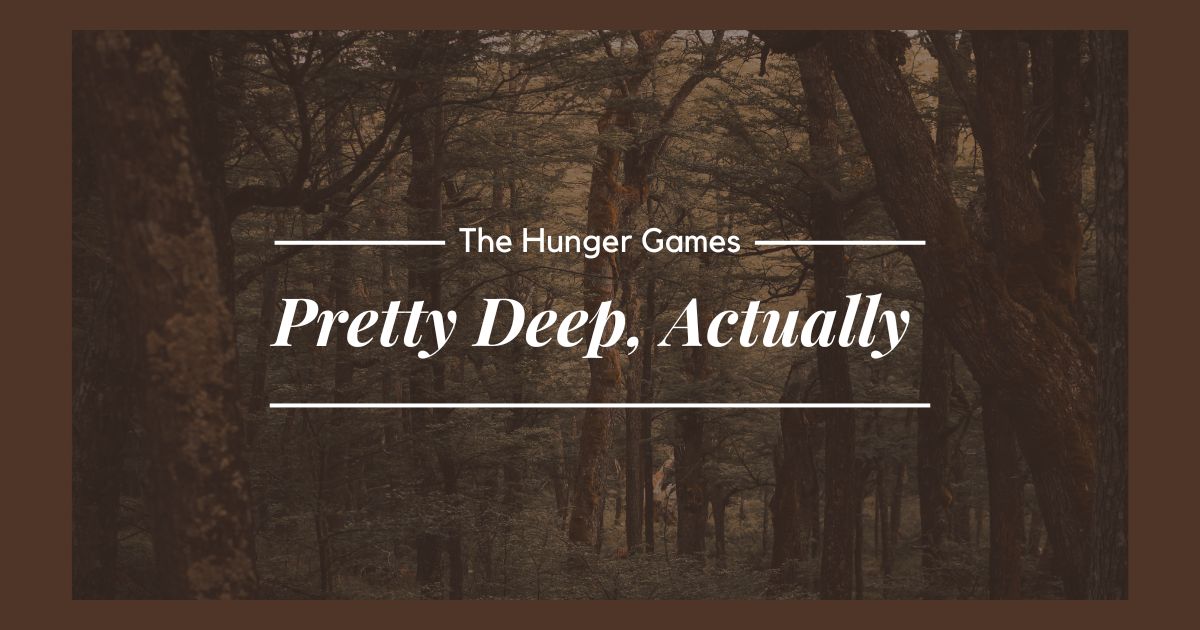This blog contains spoilers for The Hunger Games trilogy and the prequel, The Ballad of Songbirds and Snakes.
I’ve read The Hunger Games twice in my life. The first time was when I was in the 7th grade. It just came out, and none of my friends had read it yet. I was so absorbed. I remember reading it late into the night by the light of my hot pink Razr flip phone (on which I had to continuously press buttons to keep lit – this was the era before built-in flashlights).
The second time was two years later for an English class assignment as a freshman in high school. The movies began releasing not long after – at which point, it officially captured the zeitgeist of the time. Young adult dystopian literature boomed as a result.
Now as adult, I had the pleasure of revisiting Panem through the eyes of the villain. The prequel, A Ballad of Songbirds and Snakes, presents us with the 10th hunger games – and a whole new lens through which to analyze these books.
First things first: What are these books about?
- The Hunger Games: Katniss Everdeen volunteers for the hunger games, a death match enforced by their government, to protect her sister. Now she has to survive a treacherous arena with 23 other contestants who must fight to the death. Last person alive wins.
- Catching Fire: Katniss returns to the arena for the Quarter Quell, but the stakes are rising and a rebellion is brewing.
- Mockingjay: Now a full-fledged member of (and poster girl for) the resistance, Katniss navigates the complexities of war, personal loss, and the pursuit of justice as everything comes to a head.
- Ballad of Songbirds and Snakes: Coriolanus Snow, before he became the infamous tyrannical president of Panem, was a boy whose family fell on hard times. As a student, he’s given a shot at glory by mentoring a contestant in the hunger games – but they give him the humiliating assignment of Lucy Gray, the female contestant of District 12.
The part everyone knows
Alright – let’s get the first part out of the way. At its core, The Hunger Games presents a scathing satire of modern society. It’s the most recognizable analysis of the series, which many readers remind us of after every Met Gala.
The dystopian world of Panem is divided into districts, with the Capitol reigning supreme. This societal structure mirrors the hierarchical divisions and social inequalities prevalent in our own world. The excessive opulence of the Capitol juxtaposed against the destitution of the districts serves as a stark criticism of the vast wealth disparities and power imbalances that exist today.
But that’s not all. Let’s get a little deeper.
Manipulation based on human nature
Are humans inherently good or inherently evil? That is one of the questions The Ballad of Songbirds and Snakes poses. We see this question addressed in two main ways.
Snow’s choice
First, we see a young Snow choose to become evil. Throughout the book, Snow appears torn about what kind of person he wants to be. This dichotomy is presented through the few remaining mementos he has of his late parents. His father, who is implied to be more of the evil type, and his mother, who is good. With every decision, he agonizes over these mementos. When he finally gives in to his dark side, this moment is solidified by his choice to throw away his mother’s mementos.
We see glimmers of humanity under the surface and the relationships that mean something to him throughout, but by the end he truly becomes the Snow he was to be in the trilogy. He succumbs to his sociopathy and evil complicity.
Manipulation by the government
Secondly, and most importantly, we learn one of the reasons they chose children to participate in the games. At one point in the book, Dr. Gaul – the creator of the games – asks Snow a question like, “Who are the most innocent?”
The answer is children. And if children are put into an arena and they fight to the death to survive, then the next question is: what does that say about the basic nature of humanity?
They could argue it means that humans are naturally selfish and violent. The Capital (the name given to those in power in Panem) can now present a very specific message to its people, and it could go like this: “See – without us, there would be chaos. You need us to maintain law and order. It’s in your best interest not to rise up against us because you would be biting the hand that feeds you. And so you never forget this, we will demonstrate it to you again and again, every year, with your own children.”
Then, by broadcasting the brutal competition to the masses, the government fosters fear, dependence, and compliance. The games reflect how those in power can exploit the vulnerabilities of society to further their own agendas.
The love triangle as a metaphor
While the love triangle between Katniss, Peeta, and Gale may initially seem like a typical young adult trope, it’s a little more than that.
Choosing between love and survival, between personal desires and collective responsibilities, reflects the moral quandaries faced by those caught in the midst of war. The love triangle serves as a powerful device to explore the multifaceted nature of choices and their consequences.
As the central protagonist for the main trilogy, Katniss embodies the weight of these choices. Her decisions affect her personal life and have significant repercussions for the entire society. The internal struggle she faces while balancing her own survival, her affection for Peeta and Gale, and her commitment to the rebellion encapsulate the moral complexities inherent in war. The love triangle becomes a microcosm of the choices individuals must make when confronted with conflicting interests and ethical dilemmas.
Gale and Peeta also reflect this. Yes, there were real and tender moments. But ultimately, they were each forced to make their own hard choices to survive systemic oppression and violence. And with Katniss at the front lines, their fates were inevitably tied.
Peeta made both spur-of-the-moment and calculated decisions throughout the trilogy that tied him to Katniss because he had no other options. Announcing a fake love affair and then a fake pregnancy turned the tide of public opinion in their favor, which kept them both alive. Eventually, the Capital captured Peeta and tortured him until he was forever changed.
Gale (along with another character, Beetee) designed a double-bomb, which would play on mankind’s weakness for compassion. The first bomb would erupt, then the second round would go off after others swoop in to help the injured. It was this bomb that eventually took the life of Katniss’s little sister.
This was never a romantic story. This is, and always has been, a war story.
Why does this matter?
The Hunger Games series offers far more than a thrilling narrative; it provides a profound philosophical exploration of modern society and governmental manipulation.
By delving into these philosophical aspects, we can appreciate the depth and thoughtfulness of The Hunger Games beyond its captivating storyline. It reminds us to critically examine our own society, question power structures, and recognize moral dilemmas.
Check out some of my other recent blogs:
- Book fairs, Rachel Gillig, & May memes
- Listen for the Lie: Surprisingly engaging
- The Starving Saints: Excellent fantasy horror
- The Bog Wife: Finally, a 5-star read
- April memes









2 responses to “A Philosophic Analysis of The Hunger Games: It’s deeper than you remember”
I’ll always have that place for Katniss in my mind. It is so hard to find characters who suffer and think the war the way she does, and how she survives while learning about herself and the world it’s truly heartbreaking. I’ll never forget that inner monologue she has at the very end when she’s deciding who to kill (Snow or the new “president”); it was so sad putting that scene against the Katniss in the beginning of the story who, though tough and strong, yet so innocent.
Loved the way you explained all the topics the books talk about, definitely should re-read them myself 🩷
Suzanne Collins did such an amazing job with Katniss overall. She was compelling, but also felt relatable in a way that many heroes and heroines aren’t. The series has really stood the test of time; it’s still as great a read now as when it first came out. I’m very excited for the new movie to come out!